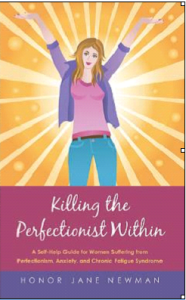So I’m dispensing all this advice on how NOT to be a perfectionist, but how do I myself actually implement these strategies in my own life? Good question. The answer is in many and varied ways. I’ve written some of these into lessons. 
Lesson 1: Fall in love with imperfectness
Yes I’ve actually learned to fall in love with my imperfectness in some ways. For example, it is very relaxing to just embrace the fact that I’m very weak in some areas and my flaws are what make me interesting and sometimes even funny. For example, the other night hubby and I were cleaning the kitchen together after dinner and I said, “how about I pack the dishwasher and then you repack it?” (Because I am a terrible dishwasher packer and he often does re-pack it because my packing is so bad!) And it was funny, that I’m shit at it, you know what I mean. I also suck at driving and some of the ways I’ve parked the car are just hilarious!
Lesson 2: reduce self- pressure, here are 5 ways I do:
1. Stop or minimize doing things I dislike
2. Fall in love with things being an imperfect part of the messy poetry of life
3. I don’t smile when I don’t feel like smiling
4. Always being genuine even it means I won’t be smiling.
5. Create a sulking space I can go to, to reset myself if I’m in foul mood I don’t want to inflict on anyone else.
Lesson 3: I trust my intuition
When you are a people pleaser you have lost connection with your own inner voice. Your insecurity about others liking you overshadows doing what is right for you. Something may feel wrong, but you do it anyway to please others. No I do not do that anymore.
Lesson 4: I have become comfortable with annoying and disappointing others occasionally
Yep this one has taken me a while. I’ve had to release a lot of guilt around this one. How did I do it? Gradually I think. At the start it was really hard but I think realizing that you can’t avoid this completely in life was one thing that helped, you know the reality check. And also I think it was a bit of a mental exercise in weighing up the needs involved. For example, I ask myself who’s needs are more important in this situation and if it’s a situation where I’m really exhausted and the other person wants me to do something minor like an errand or something, then it is clearly a no, because it’s fully my responsibility as an adult to make sure I get enough rest. Other situations are not so clear cut but it is about weighing it up and knowing when to put yourself first because you are worth caring about.
Lesson 5: I know what is my stuff and what stuff belongs to other people
I don’t take on board other people’s issues. If they get mad because I don’t do what they want, when I am behaving in a way that is right for me then I leave that anger with them.
Extra tips:
I forgive myself for my mistakes
I rest
I do things for myself, I give myself treats
I know how to move myself out of a bad mood fairly quickly
I catch myself before I head too far down that path
I acknowledge any guilt and try not to dwell there
I ask for help, this one can be really hard for me at times but I recognise that it is a healthy thing to do especially when I’m getting overwhelmed.
I make an effort to be the best person I can be, so if I make a slip up its not so often that it creates a large problem in my life.
I hope this helps!! Love and light, Honor



